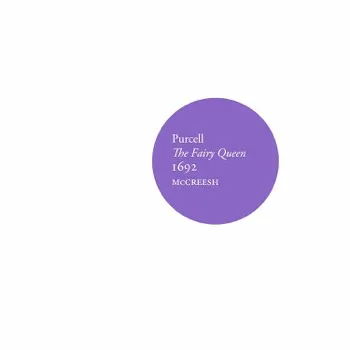“The Fairy Queen” is Paul McCreesh and Gabrieli’s second Purcell opera on their own Winged Lion label, “King Arthur” having preceded it in 2019 and reviewed here. “The Fairy Queen” is ostensibly an opera that follows the contours of Shakespeare’s “A Midsummer Night’s Dream”, but it’s more truthfully a suite of songs on the themes of love, courtship, and marriage, with dances and short “symphonies” interspersed. The booklet does provide a plot synopsis for those determined to follow the narrative.

This release is certainly cut of the same cloth as the “King Arthur” project, even if the music feels quite different. McCreesh has again collaborated with Christopher Suckling (a bass violinist in the ensemble) to produce a sensible, consistent critical edition of the score. For instance, they hypothesize that Purcell’s copyists used shorthand for choral repeats of solo verses, and take it upon themselves to regularize it: here the chorus repeats solo lines, instead of moving on to the next verse as some previous recording have done (e.g. the wonderful “If Love’s a Sweet Passion”).
The Gabrieli players also continue their successful period practices. For example, they use lower “bass violins” instead of cellos or double basses to achieve a smaller, more unified string-band feel. They also leave the lower strings out of the song accompaniments to permit “transparency of support”. These aren’t minutiae — the decisions perfuse the entire album with a previously unheard instrumental color for Purcell (to modern ears, at least). The sound-worlds are intimate and richly detailed, and evoke more theater than concert hall. The recording team has done well to further this feeling with closely mic’d instruments in solo numbers, but with distanced ones in choral parts to capture the feeling of space.
As always with Gabrieli, the music-making itself is top-notch. One of the pleasures of this album is the use of different continuo combinations to create different moods. This appears to be standard practice (compare any song’s continuo cast with that of Norrington (1993) or Gardiner (1982) and they’ll likely match), but that doesn’t dampen its effect. Check the three songs at the end of Act 2, as the characters of Mystery, Secrecy, and Sleep sing a series of lullabies. Mystery’s song gets the strong, assertive harpsichord, while Secrecy’s (the much-loved “One Charming Night”) gets beguiling, strummed theorbo and guitar, as well as feathery recorders. The same goes for the different Seasons at the end of Act 4. Spring gets the pointed harpsichord again to match the angled melody, while Summer gets a strummed continuo, now exuding enthusiastic warmth, to sing about “various sweets perfume[ing] the air.” (Anecdotally, the numbers in 3/4 tend to get the strummed continuo more often – conclude what you will about the intrinsic “mood” of the different meters).
Another joy is to hear the Gabrieli singers in different ranges and moods across the album. Soprano Anna Dennis shines in four solo numbers, first as an admonishing Mystery, later as a suffering lover, and finally as a jubilant Juno. Her voice is gentle and round, even luxurious in all cases, and she effectively changes vibrato and diction depending on the character’s mood. Tenors Jeremy Budd and James Way have four songs each, and display the same theatrical ability. It’s wonderful to hear them on adjacent tracks, Budd’s airy high-tenor for Summer followed by Way’s more full-bodied, “many-colored” Autumn. You can practically smell the blossoms giving way to fallen leaves. On the low end, Ashley Riches reprise his role as comic relief (see “Your Hay It Is Mowed” in “King Arthur”) with a well-acted, if dubiously principled, duet with Charles Daniels (track 26, “Now the Maids and the Men…”). Riches also has fun with the album’s second number, playing a drunken poet with a suspiciously dark, robust voice; at one point, as he suggests playing “blind man’s buff,” he audibly spins around in the studio! He plays an equally convincing Sleep at the end of Act 2, a testament to his artistic ability.
Overall, this album is a bit less accessible than “King Arthur;” the music does not pull you along as strongly. With that said, we’ve had so few new “Fairy Queen” recordings recently, and this one is so delectably brilliant, that it can only be enthusiastically received. Recommended in particular for Purcell enthusiasts.
Top Image: ©️ Ben Wright
Purcell – “The Fairy Queen”
Anna Dennis – Soprano
Mhairi Lawson – Soprano
Rowan Pierce – Soprano
Carolyn Sampson – Soprano
Jeremy Budd High – Tenor
Charles Daniels High Tenor / Tenor
James Way – High Tenor / Tenor
Roderick Williams – Baritone
Ashley Riches – Bass-baritone
Gabrieli Consort & Players
Paul Mccreesh – Conductor
Winged Lion, 2 CDs




















